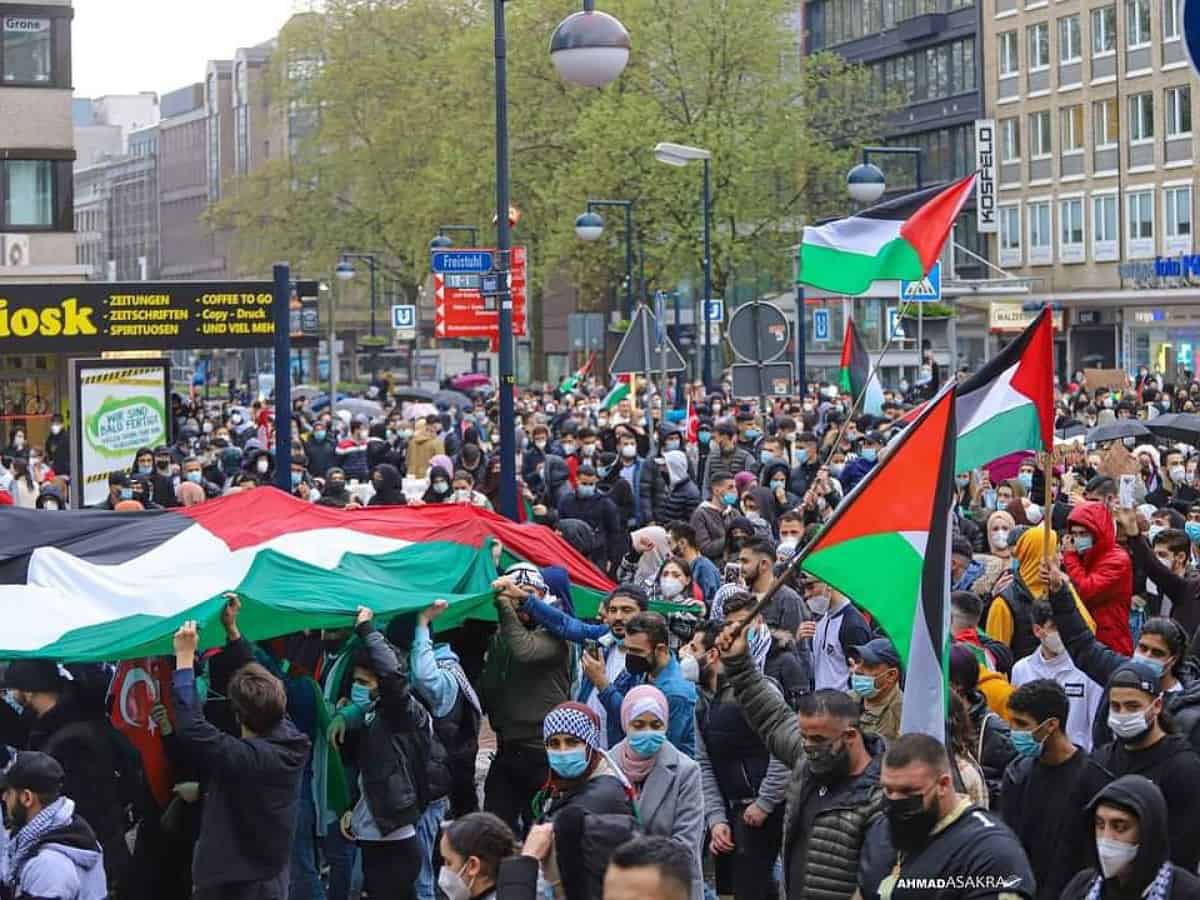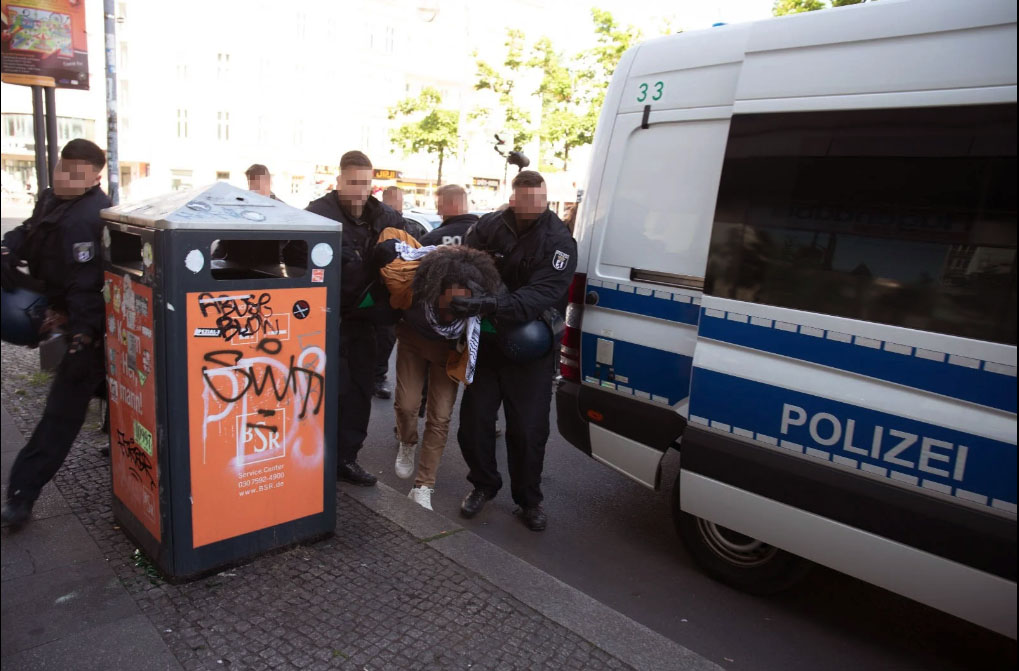
Opinions published in The Markaz Review reflect the perspective of their authors and do not necessarily represent TMR.
Abir Kopty
One of the most striking things I’ve heard since I moved to Berlin eight years ago was from a Palestinian-German friend and a mother, who told me that after every pro-Palestinian protest she takes her kids to, she tells them not to mention this to their classmates to avoid harassment and judgment at school.
I do not think this is unique. I think this is the experience of many Palestinian families in Germany, who are afraid their kids will be harassed for stating their Palestinian origin or aspirations for freedom. I’m terrified that this might be soon my experience, with my kids. That is not a fear in a vacuum. It is bred by the growing anti-Palestinian discourse in Germany. What is happening in Germany is growing racism against Palestinians amidst silence and denial of the vast political currents.
Last August, a whole incitement campaign took place in the German media against Palestinian president Mahmoud Abbas for his unfortunate use of terminology. He used “holocausts” to describe the many Israeli crimes against Palestinians, when he obviously meant massacres. An intern in Palestinian diplomacy would know he shouldn’t use this word, but Abbas did. Watching how this unfortunate use of terminology was interpreted as “Holocaust denial” by German media and politicians is irritating but predicable.
The German public sphere does not miss any opportunity to incite against Palestinians. Even the German police declared that they will open an investigation against Mahmoud Abbas for “Holocaust denial.” This is not about Germans battling Holocaust denial, but rather their attempt to export their feelings of guilt onto the shoulders of Palestinians, and moreover, to use such incidents to cover up the fact that antisemitic sentiments and racism persists in their society.
Last June, the Goethe Institut, a German state-funded cultural association, decided to disinvite prominent Palestinian writer and journalist Mohammed el-Kurd from speaking at its conference, “Beyond the Lone Offender.”
“After some consideration, the Goethe-Institut decided that Mohammed el-Kurd was not an appropriate speaker for this forum: in previous posts on social media, he had made several comments about Israel in a way the Goethe-Institut does not find acceptable,” stated the Institut.
“Appropriate” and “acceptable” are not random here — they reflect a deeply enshrined approach in Germany towards the Palestinian cause. It’s patronizing: “We, the Germans, can teach you, the victims, from our comfort zone, what should or should not be said about your oppressor.”
But it also shows how Germans are subject to a ministry of thought when it comes to Israel. The “appropriate” and “acceptable” is not according to German criteria, it’s what Israel considers appropriate and acceptable.
Being haunted by their past, Germans are trying to clean their conscious at the expense of the Palestinians. Antisemitism is not their problem any more, it is the Palestinians’. Palestinians who are not going to bear this responsibility and apologize are not appropriate and acceptable voices. Down this road there is a dangerous slope into a racist society that persecutes Palestinians for just being Palestinians.

In May, Berlin’s police banned several Nakba Day protests. When hundreds of activists took to the street despite the ban, they were faced with brutal attacks by the police, who detained scores of them. In one clip, shared by Human Rights Watch, an officer tells a woman she is being held because “she shouted ‘Free Palestine.'”
The anti-Palestinian practices and discourse have been on the rise in recent years. It’s not just populist behavior in the streets among right-wing groups. It’s not in the margins. It’s in the mainstream — among officials, elected representatives, official institutions, civil society and media.
Journalist Nemi el-Hassan was fired by the German channel WDR after a right-wing activist published a photo of her on an al-Quds March in Berlin in 2014, when she was 17, way before she became a journalist. The way the German media joined the attack on her and treated her as a sinner who needed to apologize was shameful.
Germany’s state broadcaster Deutsche Welle (DW) recently fired seven Arab and Palestinian journalists over their social media posts it condemned as “antisemitic.” Two of them, Palestinian journalists Farah Maraqa and Maram Salem, have recently won their case against the DW. The court ruled that their dismissal was not legally justified.
Also in May, an exhibition of Palestinian artists’ work as part of the renowned art festival Documenta 15 in the city of Kassel was targeted with racist vandalism.
Palestinian artists are being denied visas to come and perform in Germany. Numerous lectures and events have been cancelled over recent years after pressure and accusations of antisemitism.
In 2019, Dr Anna-Esther Younes, a German-Palestinian academic, was disinvited from speaking at an event after a secret dossier compiled about her was shared with organizers. A secret dossier!
No, these are not random unfortunate events. This is a systematic anti-Palestinianism. It’s not anymore about Germans being afraid to speak up — that job has long been accomplished; Germans often refrain from any criticism of Israel or showing any solidarity with Palestinians. It is now also leading to Germans refraining from defending the right of Palestinian voices to be heard.
This silence is allowing anti-Palestinian sentiment to settle deeply in the society’s mindset, beyond the right-wing or the Zionist lobby. This is a process that can take us to a very dark place. It is terrifying to think that this is happening in a country that has so much to learn from its own history. It is a threat to Palestinians in Germany, depriving them of a safe space to speak about their own cause in public.
The attempt by Israel’s defenders to make being pro-Palestinian rights synonymous with antisemitism is destructive for Palestinians in Germany on so many levels. It asks generations of Palestinians in Germany to regulate their identity and feelings about their homeland in a manner that is appropriate and acceptable for their oppressor.
What will come next? Forcing Palestinians to hide their identity so as not to be hunted in the streets? The story of my German Palestinian friend shows that this is already happening.
This should be extremely alarming for Germans. Trying to rid yourself of a dark past towards one group should not happen by creating a dark present for another.
Rather than retreat, we need to make a lot of noise when faced with racism, and we have to stand with everyone who faces racism, and build alliances with other communities who face racism. We need to do that for our kids, so they can grow up being proud Palestinians and human beings who hold values of dignity and freedom without any fear of bullying or harassment.




I sympathize with the Palestinians living in Berlin and in Germany, and I support what should be their right to organize protests and demonstrations in support of the Palestinian cause. You rightfully criticize the German police and government for shutting down Palestinian voices in Germany and for denying others visas to come to the country.
But you change your focus and damage your argument, in my humble opinion, when suddenly near the end of the piece, you write: “The attempt by Israel’s defenders to make being pro-Palestinian rights synonymous with antisemitism is destructive for Palestinians in Germany on so many levels.”
You offer no examples of this in the article. You throw in this statement without backing it up, whether it is true or not. This is a whole other subject. There are hundreds, perhaps thousands, of Israelis living in Berlin, and I would guess that many support the right of Palestinians there to express themselves, and do not support the politics of the Israeli government. This paragraph does not belong in this article. The German government is not the “Zionist lobby,” whatever that means. Thank you for an otherwise good article. If you would like to exchange on this, I would be happy to do so. Brett Kline